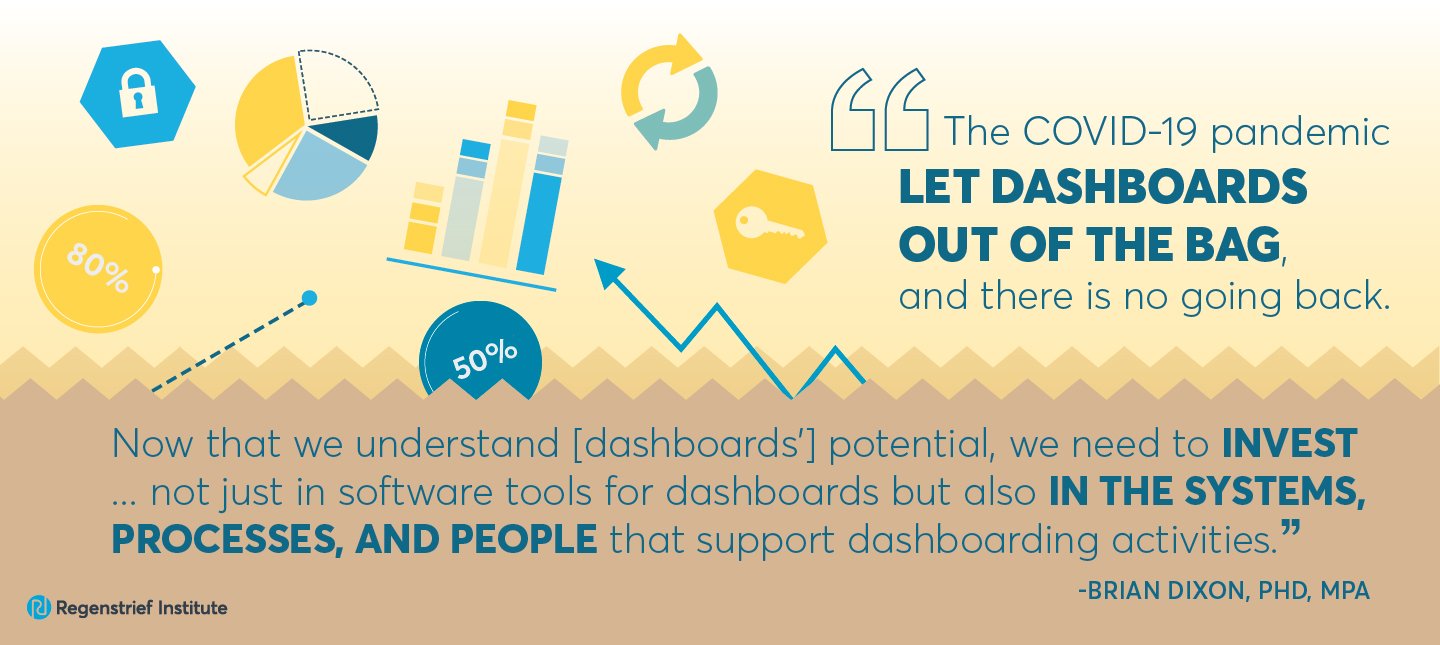Investing in people, processes and technology will be necessary for quality visualizations of future public health threats
An editorial authored by Regenstrief Institute and Indiana University Richard M. Fairbanks School of Public Health research scientists and published in the American Journal of Public Health calls for investing in people, processes and technology so health dashboards, so useful and popular during the COVID-19 pandemic, can efficiently and effectively guide public health action in the future, tracking concerns such as cancer, HIV, traffic injuries or the next emerging public health threat.
“For many years, people have desired to know more — contacting their local or state public health department to, for example, learn about current cancer rates in their county or inquire about disease rates in their state. But typically, public health departments have produced static annual reports based on two- or three-year-old data, which can’t answer these questions or provide guidance to those who must make decisions now,” said editorial lead author Brian Dixon, PhD, MPA, director of public health informatics for Regenstrief Institute and Fairbanks School of Public Health. “There has been quite a bit of interest in modernizing public health reporting to keep the public and policy makers informed about what’s happening in their community. And that’s the need that COVID-19 dashboards, for example our Regenstrief Institute COVID-19 dashboard and many state dashboards, with their visualizations of timely data, often by location, age, race and sex, on such things as hospitalizations, emergency visits, ICU admits, hospital mortality, testing and vaccine uptake, have so clearly met.”
As the editorial noted, “The COVID-19 pandemic let dashboards out of the bag, and there is no going back. Now that we understand their potential, we need to invest in public health such that local, state, and federal agencies are equipped to develop, deploy, and maintain dashboards for emerging health threats and many other critical activities they do to advance population health. This means investing not just in software tools for dashboards but also in the systems, processes, and people that support dashboarding activities. Only then can dashboards achieve their goal of visualizing information so that decision-makers can effectively guide public health action and the public can understand health trends and why they should support recommended actions.”
“Software and computers can be purchased but it will take more than software and hardware to produce dashboards to inform those who need to know about disease and injury in their community, state or nation,” said Dr. Dixon. “Public health departments have to move away from human data entry coupled with faxed paper-based processes to automated, timely acquisition of accurate and complete sets of electronic data. In addition to experts in investigating patterns and causes of disease and injury, these typically poorly funded groups have to attract and retain individuals who understand the data and can manage it to create the constantly updating maps, charts and infographics that we all want to see. Highly trained epidemiologists and data scientists, often called informaticians, will be needed to collect, store and analyze complex data and to devise and manage dashboards across diseases and processes.”
Authors of “Dashboards Are Trendy, Visible Components of Data Management in Public Health: Sustaining Their Use After the Pandemic Requires a Broader View” in addition to Dr. Dixon are Shandy Dearth, MPH, and Thomas J. Duszynski, PhD, MPH, of the IU Fairbanks School of Public Health and Shaun J. Grannis, M.D., M.S., of the Regenstrief Institute and IU School of Medicine.
About Brian E. Dixon, PhD, MPA
In addition to his role as director of public health informatics for Regenstrief Institute and Indiana University Richard M. Fairbanks School of Public Health, Brian E. Dixon, PhD, MPA is a research scientist at Regenstrief and an associate professor of epidemiology at the Fairbanks School of Public Health. He is also an affiliate scientist at the U.S. Department of Veterans Affairs Health Services Research and Development Center for Health Information and Communication, Richard L. Roudebush VA Medical Center.
About Shaun Grannis, M.D., M.S.
In addition to his role as the vice president for data and analytics at Regenstrief Institute, Shaun Grannis, M.D., M.S., holds the Regenstrief Chair in Medical Informatics and a professor of family medicine at Indiana University School of Medicine.
About Regenstrief Institute
Founded in 1969 in Indianapolis, the Regenstrief Institute is a local, national and global leader dedicated to a world where better information empowers people to end disease and realize true health. A key research partner to Indiana University, Regenstrief and its research scientists are responsible for a growing number of major healthcare innovations and studies. Examples range from the development of global health information technology standards that enable the use and interoperability of electronic health records to improving patient-physician communications, to creating models of care that inform practice and improve the lives of patients around the globe.
Sam Regenstrief, a nationally successful entrepreneur from Connersville, Indiana, founded the institute with the goal of making healthcare more efficient and accessible for everyone. His vision continues to guide the institute’s research mission.
About the Richard M. Fairbanks School of Public Health
Located on the IUPUI and Fort Wayne campuses, the Richard M. Fairbanks School of Public Health is committed to advancing the public’s health and well-being through education, innovation and leadership. The Fairbanks School of Public Health is known for its expertise in biostatistics, epidemiology, cancer research, community health, environmental public health, global health, health policy and health services administration.











